
- Sep 8, 2025
- 12 min read
What to Do When a U.S. Citizen Dies Abroad: Your Complete Crisis Response Guide
When you receive the devastating call that a U.S. citizen has died abroad, you’re immediately thrust into a complex web of international bureaucracy involving consular procedures, local foreign regulations, document authentication requirements across multiple government agencies, and time-sensitive decisions that must be made while grieving—a process that Memorial Industries has successfully navigated over 500 times across 47 countries, transforming what typically becomes weeks of overwhelming family burden into a coordinated professional response that brings your loved one home with dignity while protecting you from the bureaucratic chaos that devastates unprepared families.
The fundamental choice you face in these critical first hours is whether to spend the next two to four weeks of your life learning foreign legal procedures, navigating language barriers with international morgues and embassies, coordinating complex shipping logistics across multiple countries, and managing countless details that specialist repatriation companies handle routinely—or to transfer this entire burden to professionals who maintain established relationships with vetted providers in forty-seven countries and have developed streamlined processes that typically complete international repatriation within five to seven days while keeping your family informed without overwhelming you with operational complexities.
This comprehensive guide provides both pathways: the complete government procedures you must understand if handling arrangements yourself, and the professional alternative that Memorial Industries provides to families who recognize that grief counseling and family support represent better uses of their emotional energy than navigating international bureaucracy during the most difficult period of their lives.
Understanding Your Two Critical Pathways Forward
Memorial Industries’ professional crisis response means making a single emergency call (+1-617-306-2716) that immediately connects you with specialists who have successfully managed over 500 international death cases, possess comprehensive knowledge of consular procedures and foreign regulatory requirements, maintain pre-established relationships with vetted funeral providers across forty-seven countries, and can typically initiate the complete repatriation process within hours rather than the days or weeks required when families attempt to coordinate these procedures independently.
Self-management through embassy and government channels requires you to personally navigate the twenty-four hour duty officer system at U.S. consulates, coordinate directly with foreign hospitals and morgues for body storage and preparation, manage the complex Consular Report of Death Abroad documentation process, arrange for certified translation of all local death certificates and legal documents, coordinate with foreign health ministries for export permits, secure appropriate international shipping containers and airline cargo bookings, and handle customs clearance procedures in both countries—all while ensuring strict compliance with international aviation regulations for human remains transport.
The critical distinction extends beyond convenience to encompass speed, reliability, and family protection: professional management leverages existing infrastructure and regulatory relationships that have been developed through hundreds of successful cases, while government-only approaches force grieving families to learn complex international procedures under extreme emotional stress and time pressure, often resulting in costly delays when inexperienced families encounter the bureaucratic obstacles that repatriation specialists have learned to anticipate and avoid.
The First 24 Hours: Your Critical Action Window
Professional crisis response through Memorial Industries transforms the chaotic first twenty-four hours into a coordinated process where our specialists immediately contact the relevant embassy, begin documentation gathering, coordinate with local authorities, and establish communication with vetted funeral providers—while your family focuses on emotional support and making informed decisions about repatriation options rather than learning emergency international procedures during the most traumatic period of your lives.
Families choosing to navigate government procedures independently must immediately contact the nearest U.S. embassy’s twenty-four hour duty officer, secure preliminary death documentation from local authorities, begin the Consular Report of Death Abroad application process, and coordinate directly with foreign morgues for body storage—all while simultaneously researching local funeral providers, understanding foreign regulatory requirements, and making complex logistical decisions without the benefit of professional experience or established provider relationships.
The embassy duty officer serves as your primary government contact and can provide lists of local funeral homes, explain consular procedures, and initiate the official notification process—but cannot make arrangements on your behalf, coordinate with service providers, or handle the complex logistics that professional repatriation companies manage as their core business function.
Understanding U.S. Embassy Support and Limitations
The Consular Report of Death Abroad (CRDA) represents the official U.S. government certification of an American citizen’s death overseas, serving the same legal purpose as a state-issued death certificate and proving essential for insurance claims, estate settlement, Social Security benefits, and all legal proceedings within the United States—a document that Memorial Industries’ specialists help families obtain efficiently through our established embassy relationships, while families managing procedures independently often experience weeks of delays due to incomplete documentation or misunderstanding of consular requirements.
Processing time for the CRDA typically ranges from several days to two weeks depending on local circumstances and whether families have properly prepared all required documentation, including the local death certificate, proof of U.S. citizenship, next of kin identification, and any additional documents requested by the specific embassy—requirements that Memorial Industries’ specialists understand completely and can expedite through our established consular relationships.
Embassy officials maintain lists of local service providers experienced in international cases, including funeral homes, certified translators, and legal professionals, but cannot recommend specific providers or guarantee their services—a limitation that Memorial Industries addresses by maintaining our own vetted network of providers across forty-seven countries who have demonstrated their ability to meet our exacting standards for dignified care, regulatory compliance, and timeline adherence through years of successful collaboration.
The Critical Decision: Professional Management vs. Government-Only Approach
Memorial Industries’ comprehensive crisis response eliminates the overwhelming burden of coordinating with multiple foreign agencies by providing a single point of contact that manages all aspects of international repatriation, from initial embassy coordination and documentation gathering to airline cargo booking and customs clearance, while maintaining established relationships with vetted providers who understand our quality standards and can execute complex logistics efficiently without the learning curve that devastates families attempting these procedures for the first time.
Families choosing to handle procedures independently must personally coordinate with foreign hospitals for proper refrigerated storage, navigate local police bureaucracy for death investigation clearance, work with embassy consular sections for official documentation, engage certified translation services for legal document conversion, arrange for embalming or body preparation meeting international transport standards, secure appropriate shipping containers complying with aviation regulations, book cargo space on airlines certified for human remains transport, and manage customs procedures in both countries.
The financial considerations extend beyond simple cost comparison to encompass the value of family time and emotional resources during crisis: while professional repatriation services represent a significant investment, the alternative requires family members to dedicate weeks of full-time effort to learning and executing complex international procedures, often resulting in costly mistakes and delays that can add thousands of dollars to the total expense while subjecting families to additional weeks of uncertainty and bureaucratic frustration.
Understanding Repatriation Logistics and Requirements
Professional repatriation through Memorial Industries means your loved one receives proper preparation according to international standards through our vetted provider network, with all necessary documentation prepared correctly, airline cargo bookings secured through our established relationships, and customs clearance handled by specialists who understand both countries’ requirements—eliminating the risk of devastating delays that occur when inexperienced families encounter documentation problems or regulatory compliance issues.
Self-managed repatriation requires understanding that intact remains need professional embalming according to international standards, hermetically sealed caskets meeting specific airline requirements, export permits from the country of death, import documentation for U.S. Customs, and airline cargo booking for human remains transport—with failure to meet any single requirement potentially causing weeks of delays and additional costs that families discover only after beginning this complex process.
Cremated remains involve different but equally complex requirements, including official cremation certificates, proper containment in approved urns, export and import permits, and airline approval—though cremated remains can often travel as accompanied baggage or cargo rather than requiring specialized human remains cargo handling, making this option faster and less expensive while still requiring careful coordination of international documentation requirements.
Financial Considerations and Available Resources
International repatriation costs typically range from seven thousand to fifteen thousand dollars through professional services, while families attempting self-management often spend comparable amounts after accounting for mistakes, delays, and lack of established provider relationships—with the critical difference being that professional services deliver predictable timelines and guaranteed results, while self-management creates financial uncertainty and extends family suffering through prolonged uncertainty and bureaucratic delays.
Memorial Industries’ specialists help families maximize available financial resources including travel insurance repatriation coverage, employer death benefits, credit card travel protection, and veteran’s affairs assistance—expertise that proves invaluable since insurance companies often deny claims when families fail to follow proper procedures or documentation requirements, making professional guidance essential for securing available benefits that can significantly offset repatriation costs.
Emergency government loans for repatriation represent last-resort options available only in rare circumstances, requiring families to sign promissory notes with interest charges and legal consequences for non-payment—assistance that Memorial Industries helps families avoid through comprehensive insurance review and financial resource optimization that typically identifies sufficient coverage without requiring government debt obligations.
Managing Documentation and Government Notifications
Memorial Industries’ specialists coordinate all required government notifications including Social Security Administration reporting, Internal Revenue Service requirements, Department of State passport cancellation, and state vital records updates—ensuring proper procedures are followed and all necessary documentation is provided while families focus on emotional healing rather than bureaucratic requirements that continue for months after repatriation.
Families managing procedures independently must personally contact multiple government agencies with proper documentation, understand varying requirements for different agencies, ensure prompt notification to stop benefit payments and initiate survivor benefits, and maintain detailed records for ongoing estate settlement—responsibilities that Memorial Industries handles comprehensively through our established relationships with government agencies and understanding of their specific documentation requirements.
Veterans and military service members qualify for additional benefits through Veterans Affairs and military mortuary affairs offices, including burial allowances, military funeral honors, and specialized repatriation assistance—benefits that Memorial Industries helps families access through our understanding of military procedures and established relationships with VA officials who handle international death cases.
Personal Effects and Chain of Custody Management
Local authorities typically secure the deceased’s belongings pending family instructions, requiring detailed written inventories and careful chain of custody documentation to prevent loss or disputes—responsibilities that Memorial Industries manages through our local provider network who understand proper inventory procedures and can coordinate secure shipping of personal effects separately from remains repatriation.
Shipping personal effects requires separate arrangements understanding customs regulations for both countries, with options including international shipping companies, limited inclusion with remains transport, or personal transport by traveling family members—decisions that Memorial Industries helps families make based on the specific items involved, shipping costs, and family preferences while ensuring proper customs compliance in both countries.
Special Circumstances and Emergency Guardianship
When minor children survive the deceased abroad, immediate legal steps become necessary including establishing temporary local guardianship through embassy assistance, obtaining emergency travel documents, and coordinating with child welfare authorities—complex procedures that Memorial Industries helps families navigate through our network of international legal contacts and understanding of child welfare requirements across different countries.
The embassy can provide lists of local attorneys and explain country-specific requirements, but families must personally manage legal proceedings if custody is unclear or multiple jurisdictions are involved—situations where Memorial Industries’ international experience proves invaluable for understanding complex legal procedures and coordinating with appropriate authorities efficiently.
Need Immediate Crisis Response?
If you’re facing an international death situation right now, time is critical for preserving your loved one and minimizing additional trauma to your family. Memorial Industries’ crisis response team has managed over 500 successful international repatriations and maintains emergency relationships with vetted providers in 47 countries.
Memorial Industries Crisis Hotline: +1-617-306-2716 (Available 24/7)
Average Response Time: Under 2 hours
Languages Available: English, Spanish, French, German, Persian, Japanese
Countries Covered: 47 nations with established provider networks
Our specialists will immediately assess your specific situation, provide country-specific guidance, coordinate with the appropriate embassy, and begin the repatriation process to bring your loved one home with dignity while protecting your family from the overwhelming bureaucratic complexity that devastates unprepared families attempting to navigate international procedures during crisis.
Government Procedures: Complete Step-by-Step Guide
For families who choose to manage procedures independently, understanding the complete government process proves essential for avoiding costly delays and ensuring proper handling of all requirements—though Memorial Industries strongly recommends professional assistance given the complexity and emotional burden of these procedures during grief.
Embassy Contact and Initial Documentation
Contact the nearest U.S. embassy’s twenty-four hour duty officer immediately upon learning of the death, providing the deceased’s full name, date and place of birth, passport number if available, circumstances of death, and your relationship and contact information—information that triggers the official government response including CRDA preparation and access to local resources.
Gather preliminary death documentation from local hospitals, police departments, or attending physicians to provide official confirmation that enables embassy procedures to begin immediately rather than waiting for final death certificates that may take weeks to process in some countries.
Consular Report of Death Abroad Process
Submit required documentation to embassy consular officials including the local death certificate or preliminary documentation, proof of U.S. citizenship such as passport or birth certificate, identification and contact information for next of kin, and any additional documents requested by the specific embassy—requirements that vary by country and circumstances.
Plan to provide multiple original copies of these documents as various agencies will require them throughout the process, and obtain several certified copies of the completed CRDA for insurance claims, estate matters, and other legal purposes that continue long after repatriation.
Local Death Registration and Translation
Obtain the official local death certificate from the issuing authority, which might be the hospital, municipal registry, or regional health department depending on the country, and arrange for certified translation into English by approved translators from embassy-provided lists or local funeral home recommendations.
Understand apostille and legalization requirements for the death certificate to be valid in U.S. legal proceedings, insurance claims, and estate settlements—processes that must come from designated authorities in the country where death occurred and may require additional authentication through foreign ministries or U.S. embassy procedures.
Understanding the Complete Repatriation Process
Professional embalming according to international standards requires engagement with qualified local funeral providers who understand aviation regulations for human remains transport, proper container requirements, and documentation standards that airlines and customs officials expect—standards that Memorial Industries ensures through our vetted provider network.
Export permit applications require submission of proper documentation to local authorities with processing times varying significantly between countries and jurisdictions—delays that Memorial Industries minimizes through our established relationships with foreign regulatory agencies and understanding of their specific requirements and processing procedures.
Airline coordination involves booking specialized cargo space for human remains transport, confirming all documentation requirements are met, understanding restrictions and requirements that differ between carriers, and ensuring proper ground transportation arrangements at both departure and arrival airports—logistics that Memorial Industries handles routinely through our established airline relationships.
Costs, Insurance, and Financial Planning
Travel insurance policies often include repatriation coverage but with varying limits and specific procedural requirements that must be followed precisely to avoid claim denial—requirements that Memorial Industries understands completely and helps families navigate to maximize available benefits that can significantly offset repatriation costs.
Employer benefits may include death and repatriation coverage for employees and dependents traveling on business or personal travel, with human resources departments able to quickly confirm available benefits—assistance that Memorial Industries provides through our understanding of various employer benefit structures and claim procedures.
Credit card benefits sometimes include travel insurance with repatriation coverage when travel is booked using the card, though coverage limits and procedural requirements vary significantly between card issuers—benefits that Memorial Industries helps families identify and properly claim through our experience with various insurance programs.
Government Agency Notifications and Ongoing Requirements
Social Security Administration notification stops monthly benefit payments and initiates survivor benefit processing, though families should follow up with local offices using the CRDA and translated death certificate to ensure proper handling—procedures that Memorial Industries manages comprehensively to prevent delays or complications in benefit processing.
Internal Revenue Service requirements for final tax returns and estate tax obligations require certified copies of both CRDA and translated death certificates, with foreign assets or income potentially complicating filing requirements—responsibilities that Memorial Industries coordinates with families’ tax professionals to ensure proper compliance.
Department of State passport cancellation requires returning the deceased’s U.S. passport with proper documentation requesting cancellation due to death—procedures that Memorial Industries handles as part of our comprehensive family support services while families focus on emotional healing and memorial planning.
The Professional Alternative: Why Families Choose Memorial Industries
Memorial Industries transforms the devastating complexity of international death procedures into coordinated professional response that brings your loved one home with dignity while protecting your family from bureaucratic chaos, regulatory confusion, and the extended uncertainty that characterizes self-managed repatriation attempts—allowing your family to focus on grief counseling, memorial planning, and emotional healing rather than learning international procedures you’ll hopefully never need again.
Our established relationships with vetted providers across forty-seven countries, comprehensive understanding of regulatory requirements and cultural protocols, and streamlined processes developed through over 500 successful repatriations ensure predictable timelines, guaranteed compliance with all requirements, and family peace of mind during the most difficult period of your lives—advantages that prove invaluable when families compare the emotional cost of self-management against professional coordination.
The choice between professional management and government-only procedures ultimately depends on whether your family’s time and emotional resources during crisis are better spent learning complex international bureaucracy or focusing on supporting each other through grief while professionals handle the logistics that we manage as our core business function every day.
Emergency Contact Information and Immediate Next Steps
Memorial Industries 24/7 Crisis Response: +1-617-306-2716
Government Embassy Duty Officer: Contact nearest U.S. embassy
State Department Citizens Services: 1-888-407-4747
If death has already occurred abroad, contact Memorial Industries immediately for professional crisis response that begins coordination within hours, or contact the embassy duty officer to begin government procedures that require weeks of personal coordination and documentation management.
Remember that time is critical in international death cases for preserving your loved one, minimizing costs, and reducing family trauma—whether choosing professional assistance or government procedures, immediate action protects your options and prevents complications that become exponentially more difficult and expensive to resolve as time passes.
Your family’s emotional resources during grief represent precious assets that should be protected and directed toward healing rather than exhausted on bureaucratic procedures that professionals handle more efficiently and effectively through established experience and relationships—a fundamental consideration that guides thousands of families annually in choosing professional repatriation services over self-managed government procedures.
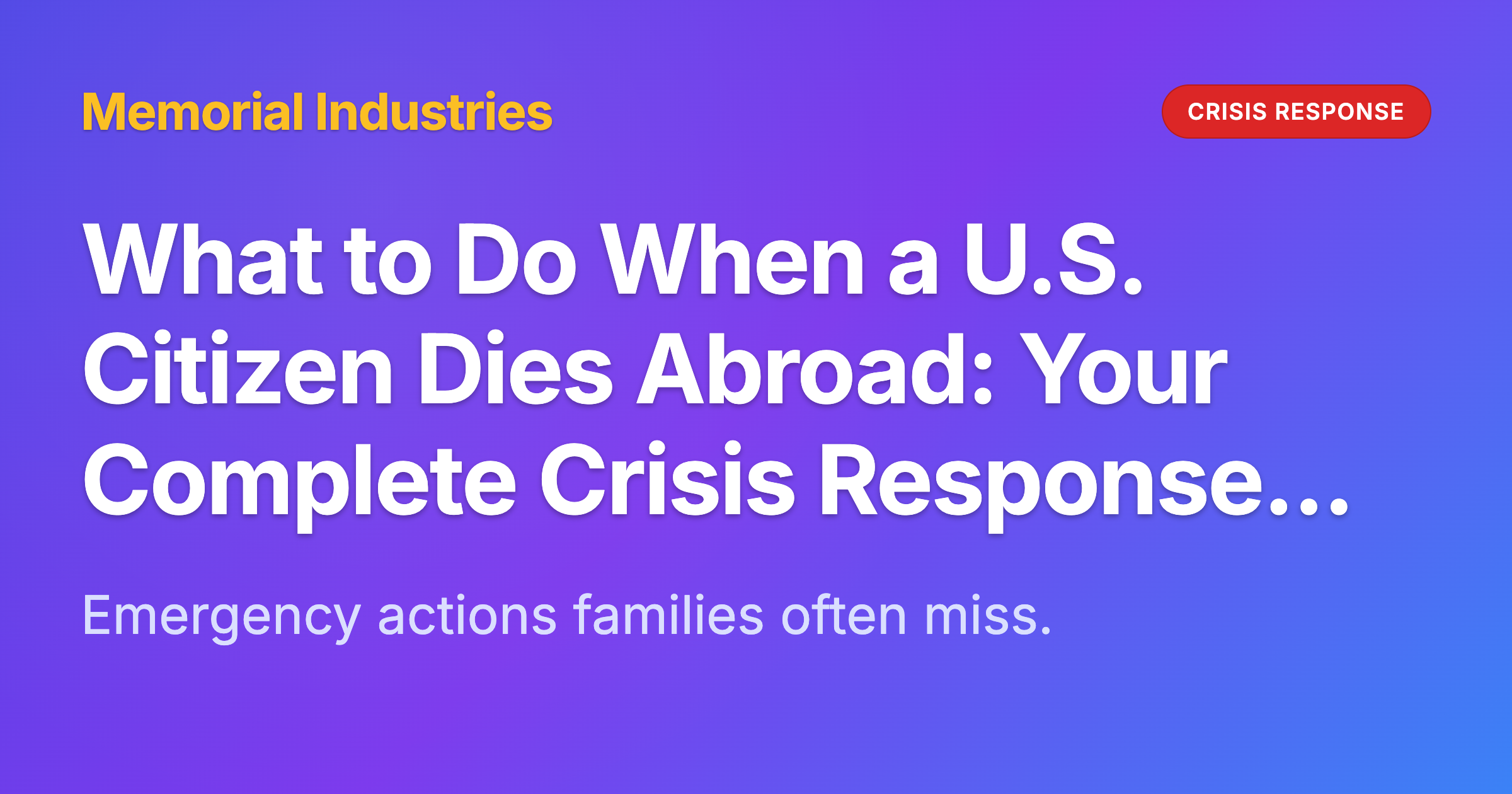
Related articles
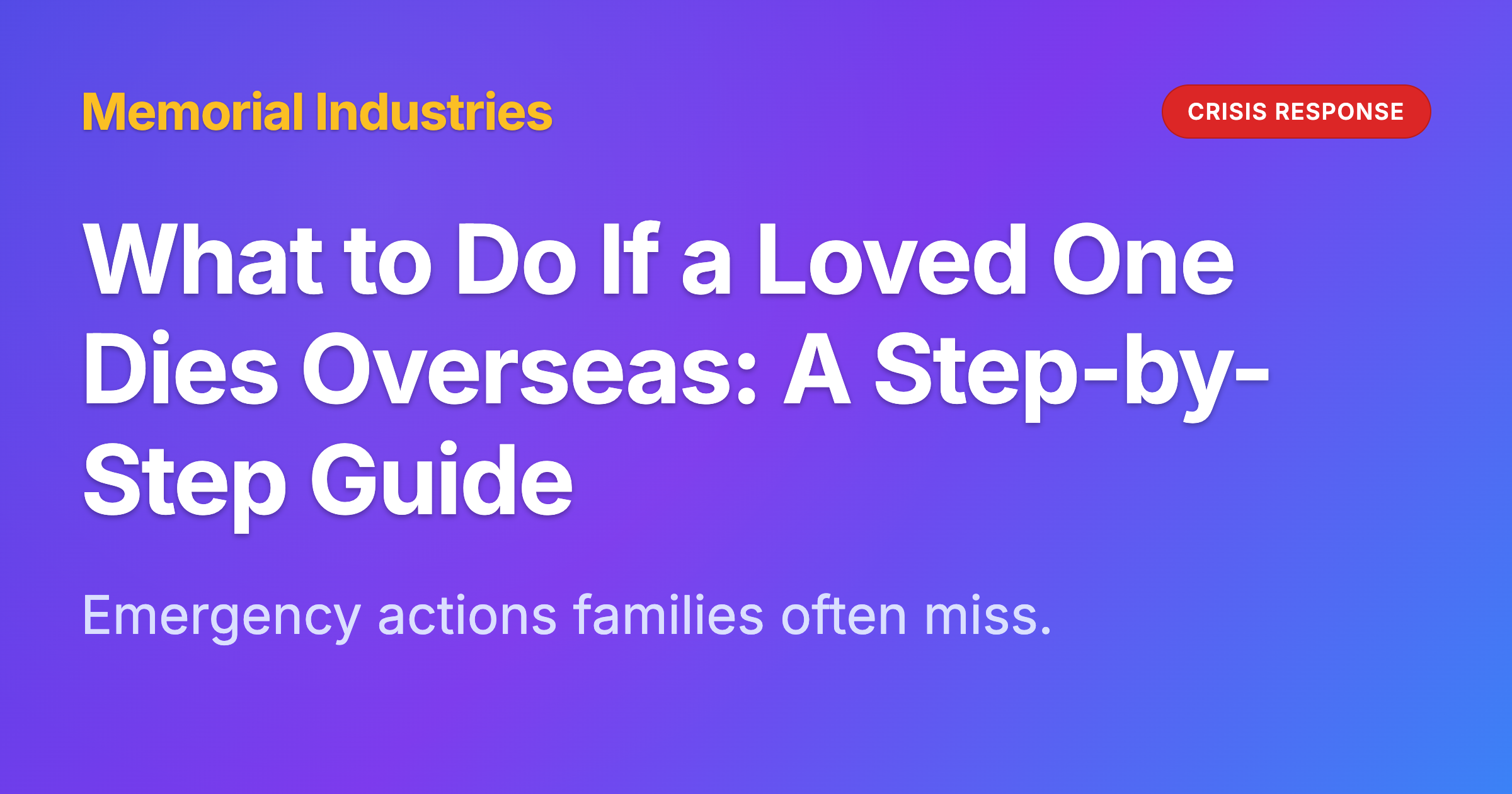
What to Do If a Loved One Dies Overseas: A Step-by-Step Guide
Jan 30, 2025
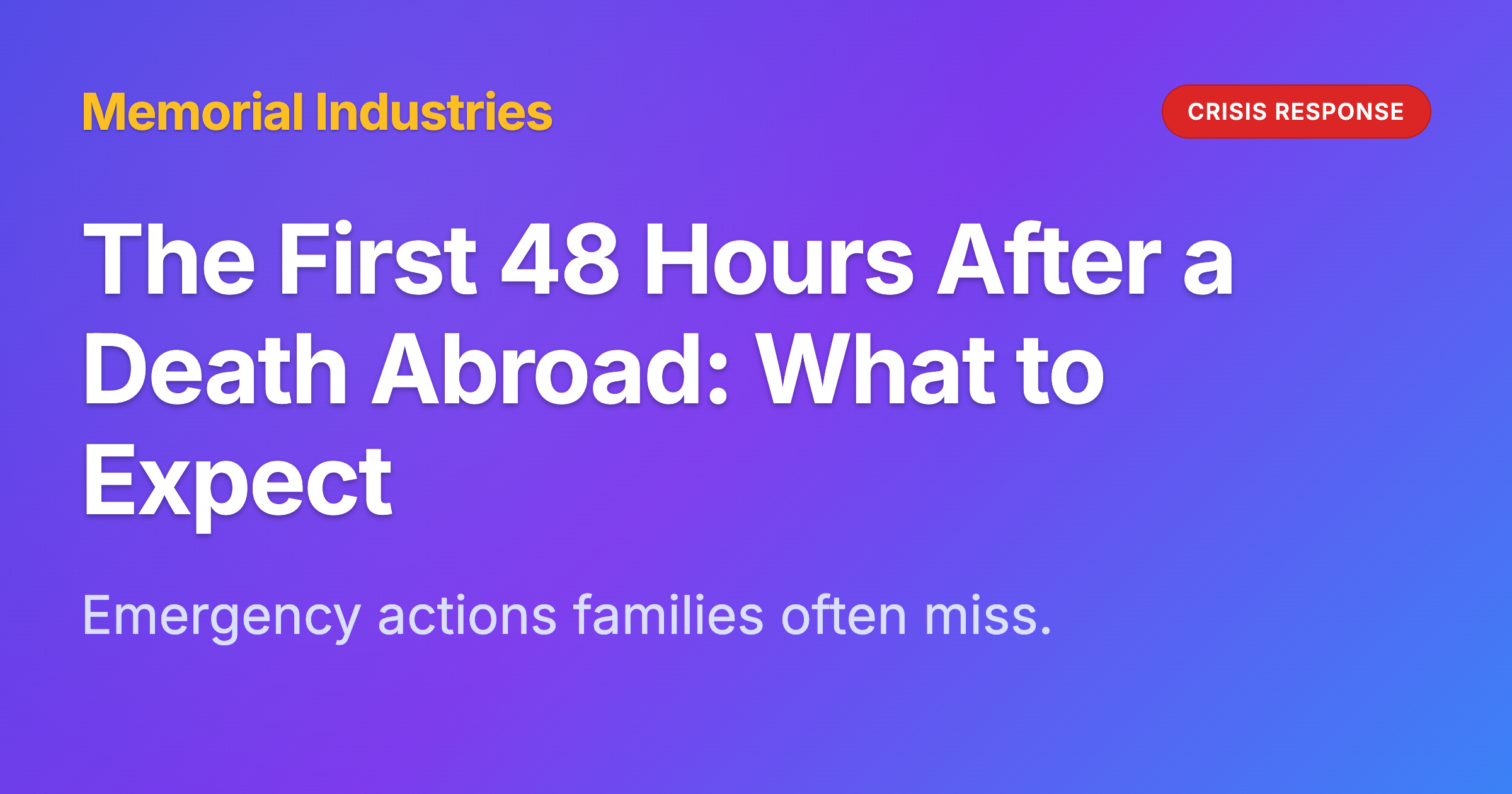
The First 48 Hours After a Death Abroad: What to Expect
Jan 27, 2025

Should You Handle Repatriation Yourself? A Family's Critical Decision Guide
Aug 19, 2025
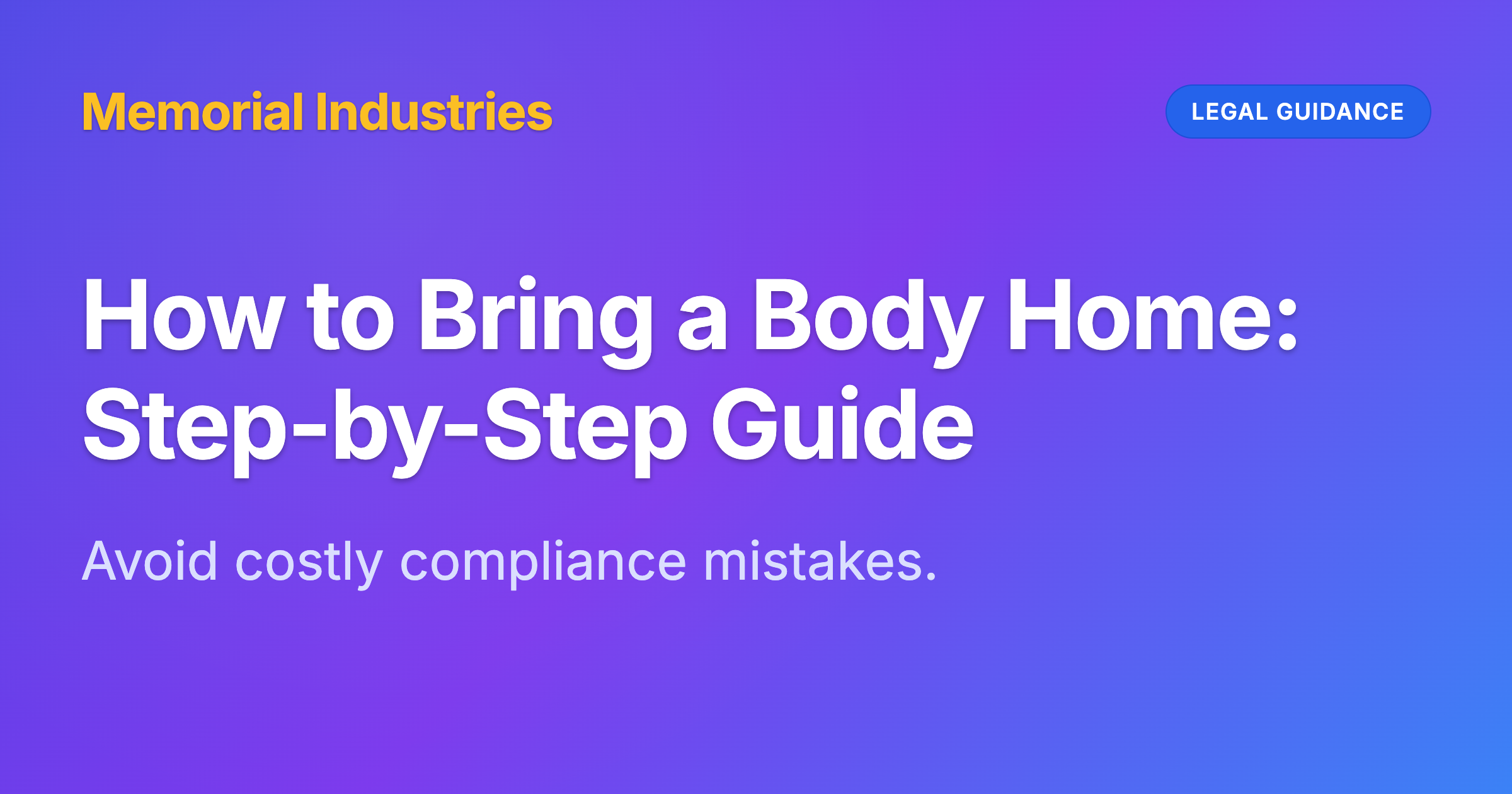
How to Bring a Body Home: Step-by-Step Guide
Jan 29, 2025
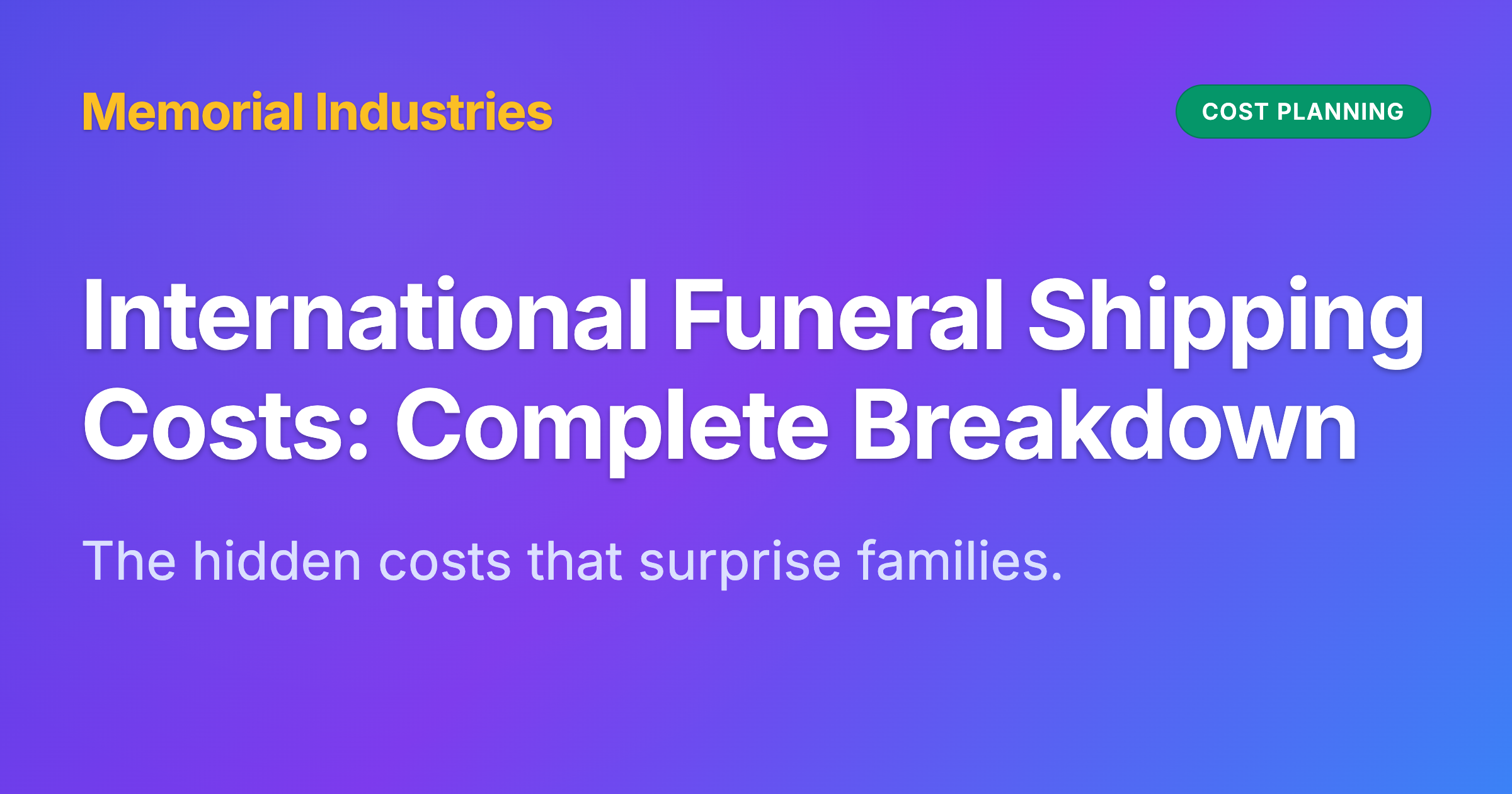
International Funeral Shipping Costs: Complete Breakdown
Jan 28, 2025

Airport-to-Airport vs Door-to-Door Funeral Shipping: Choose the Right Option
Jan 26, 2025